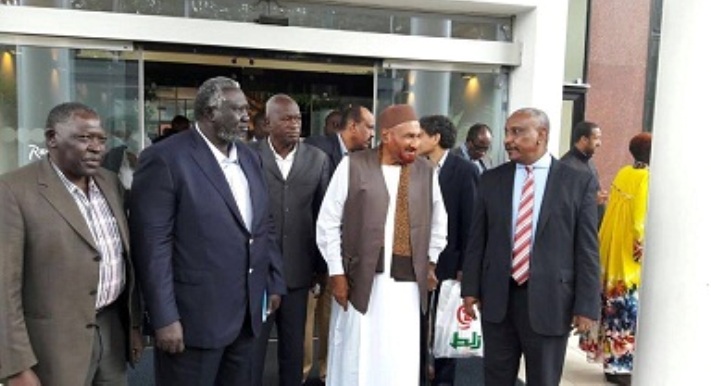Decline of attacks or internal rifts do not mean end of Sudan rebels: al-Mahdi

June 17, 2017 (KHARTOUM) – The National Umma Party (NUP) leader Sadiq al-Mahdi has called on the government to commit itself to achieve a comprehensive peace and democratic pointing that the decline of rebel military attacks in Darfur or internal divisions do not mean the end of armed groups.
The opposition leader made his remarks in a Ramadan breakfast organised by his party on Saturday, nearly three months after his return to the country from a self-imposed exile Egypt that lasted for three years.
Al-Mahdi started his speech by stressing that his party remains steadfast to its demands for genuine peace and democratic reform adding that “Any attempt to bring us to join the regime, as some people wish, is futile”.
“The only viable option is to engineer a path towards governance, peace and the Constitution that does not isolate anyone and is not controlled by anyone,” he further said.
He said there is an illusion within the government that the defeat of his political allies from the rebel groups in Darfur and the ongoing rift within the Sudan People’s Liberation Movement-North (SPLM-N) could end the “armed resistance forces” in the country.
“The truth that the armed politicised movements cannot be defeated militarily but they triumph if they are not removed from existence, but they would not be removed from existence as long as there is injustice worthy of sacrifice, and trained and armed elements,” he said.
Together with the SPLM-N, SLM-MM and JEM, al-Mahdi is a signatory of a roadmap agreement brokered by the African Union for peace and democratic rule in Sudan.
However, the government disregarded the AU-brokered roadmap and went on with its own national dialogue process, blaming the rebels’ failure to sign a humanitarian cessation of hostilities agreement in August 2016.
However, al-Mahdi reiterated his demand that the renew its commitment to the roadmap by implementing confidence-building measures, negotiating a peace agreement with the armed groups, forming a transitional government and holding an inclusive constitutional conference.
The largest opposition party was part of the government-led national dialogue process but the NUP decided to suspend its participation in the process in May 2014 following the arrest of its leader Sadiq al-Mahdi.
(ST)
